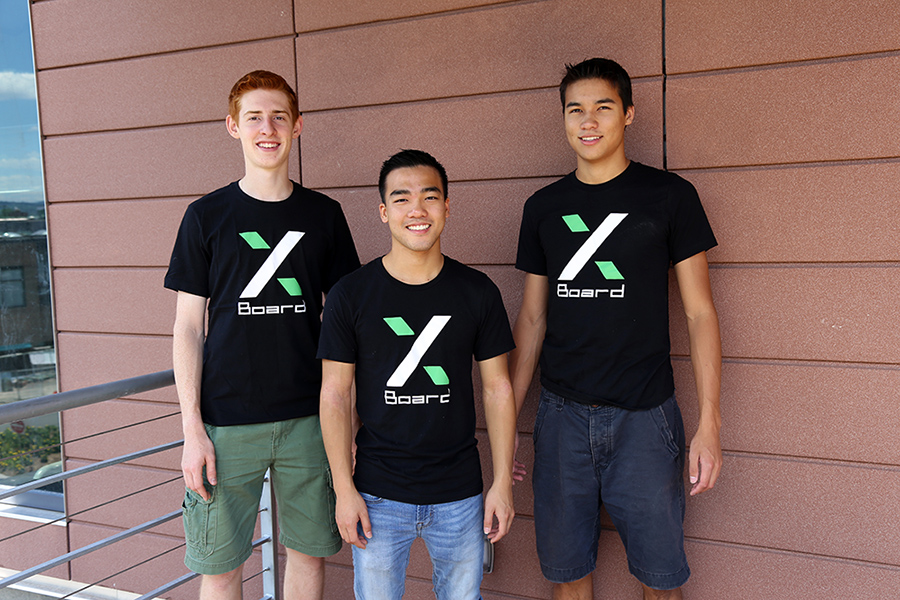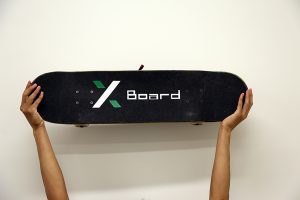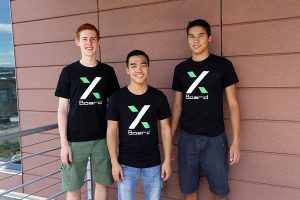
Rev Hardware Accelerator Team Goes from Drawing Board to Skateboard
Rev’s summer Hardware Accelerator is in the middle of Sprint 3, the phase in which member teams work towards prototyping their product ideas. Teams are engaging in one-on-one work with mentors and technical instructors, as well as collecting insight from successful local hardware-based startups. As the teams work toward their final product concepts and prepare for Demo Day on August 11th, we’ll be sharing profiles of them and the story of their progress.
A few months ago, several dozen skateboarders gathered in Austin, Texas at the city’s largest skate park. They were there to participant in a local skateboarding competition held by a not-so-local group of entrepreneurs: Rev 2016 Hardware Accelerator team X-Board.
“We didn’t have a working prototype at that time,” recalls X-Board team member Jeffrey Ly, a recent M.Eng graduate at Cornell. “But it was very cool. We did a lot of customer research, got some insights from the skateboarding community.”
Electric skateboarding is a growing market that offers boards partially powered by an electric motor – an exciting feature for thrill-seeking boarders looking for greater capacity for speed and tricks. X-Board is not the only electric skateboard on the market, but the team explains that theirs is about more than speed. “It’s really targeting those who are interested in innovation within the sport,” says Jeffrey. “There’s clearly a need and a desire to push that creative boundary. It’s a feature that’s core to skateboarding.”
To meet this need, Jeffrey and his team members — Eric Berg and D. Aaron Wisner (both rising sophomores in Cornell’s School of Electrical and Computer Engineering) — are developing an electronic skateboard specifically designed for skateboarders who want to do tricks. Based off an idea Eric had in high school, the original model was three-wheeled and derived from Eric’s passion for electronics and desire to get around more quickly; before joining the team, he’d already built an electric scooter and bicycle. The X-Board skateboard appears standard, but attached beneath is a battery deck that allows the board to travel at speeds up to 26 miles per hour. Most similar products on the market are controlled via a remote or phone app. The X-Board, in contrast, is guided by a sensor-driven glove; as the wearer’s hand opens and shuts, the skateboard accelerates and decelerates.
The team has been along for the ride since September 2015, when Jeffrey and Eric met by chance at a Rev Pitch Night event that both attended alone with the intention of networking. Jeffrey overheard Eric telling another guest about his skateboard idea and wanted to get involved in the project. “I went over to talk to him,” Jeffrey recalls, “and we haven’t stopped talking since!” The team members balance one another’s skills, according to Jeffrey: he focuses on the business side, Eric on the technology, and D. Aaron on the electronics.
Since forming, the X-board team has taken off as quickly as their prototype. The speedy board recently took first prize in its category at the New York State Business Competition, a contest the team was introduced to by Felix Litvinsky, managing director for Blackstone LaunchPad at Cornell. Litvinsky also introduced the team to the Rev Hardware Accelerator program. When asked if the Hardware Accelerator has contributed to the X-Board’s progress, Eric leans back and nods. “Without Rev and the entrepreneurial network here,” he says, “this wouldn’t even be a thing.” The team is also participating in Life Changing Labs this summer, a separate incubator program on Cornell’s campus.
What’s down the road for X-Board? “More programs, more competitions, more funding!” says Eric. “We’ll keep working our way up.” The team also hopes to take their product to California, where a large percentage their target market – innovative amateur and professional skateboarders — resides. But for now, they say, Ithaca has all the resources they need to launch their skateboard prototype toward success. To see X-Board in action, join us on August 11th for Demo Day. For more information about the Hardware Accelerator Program and its 2016 teams, click here.


